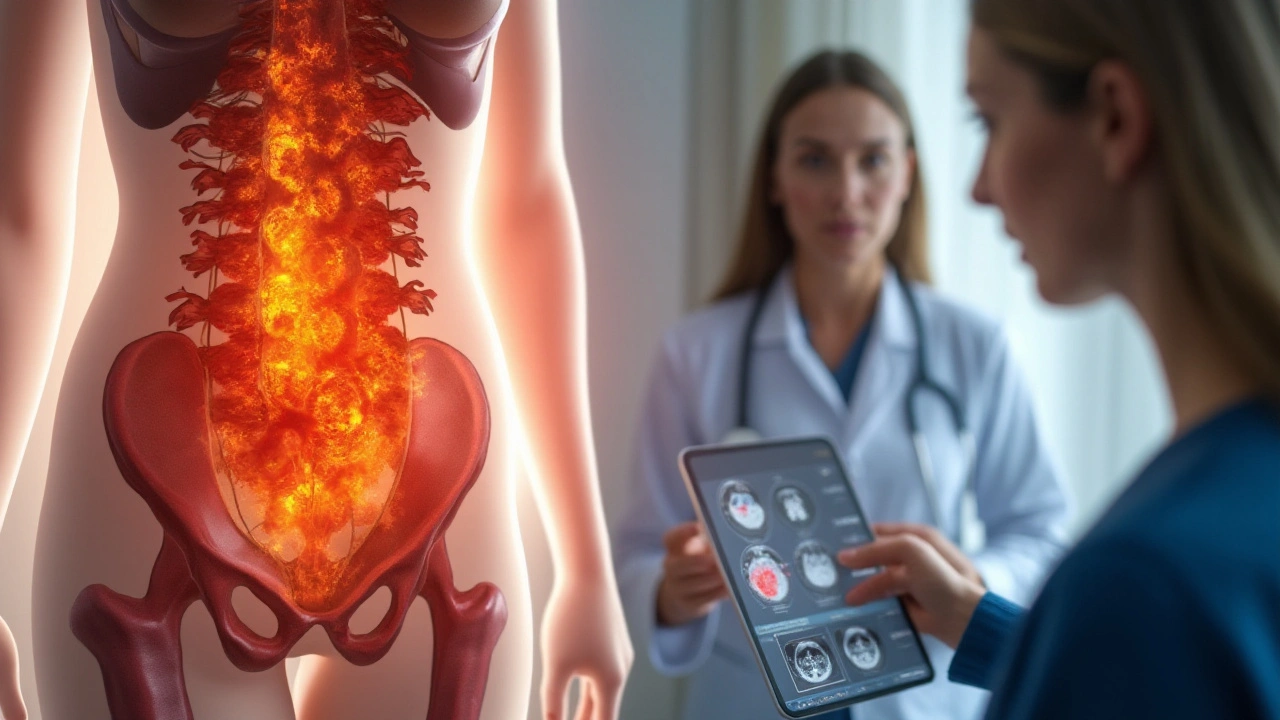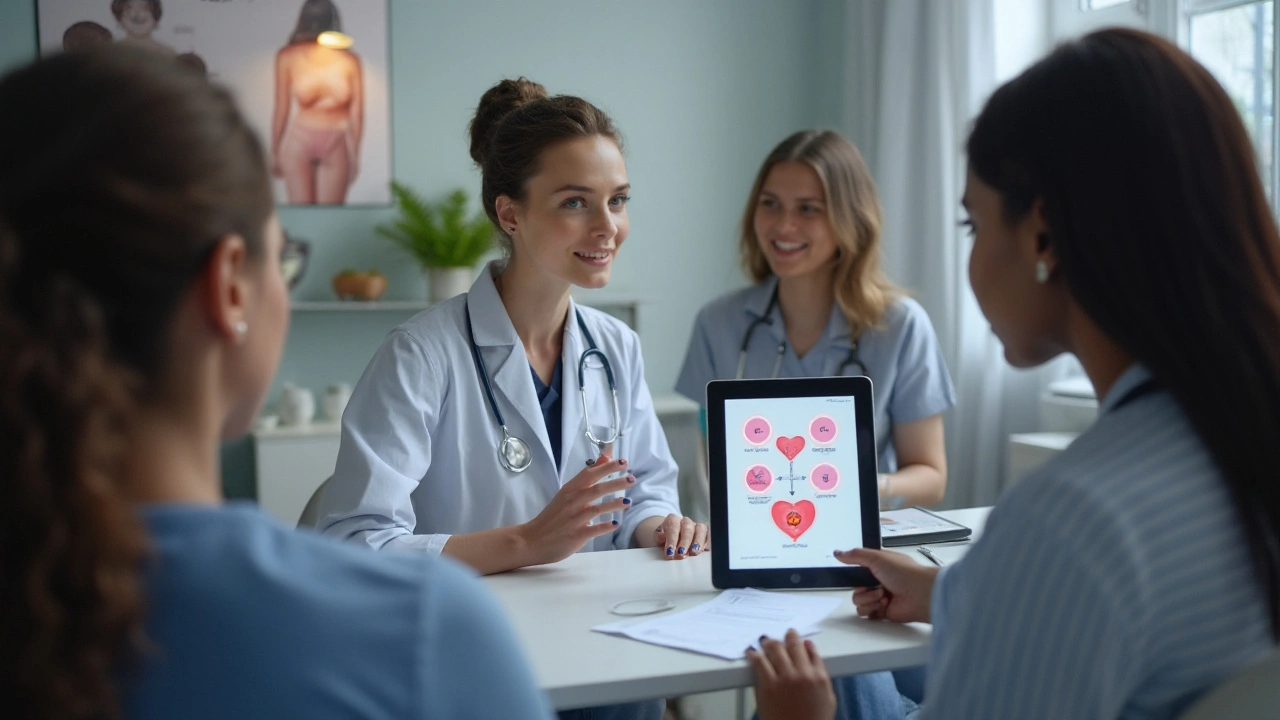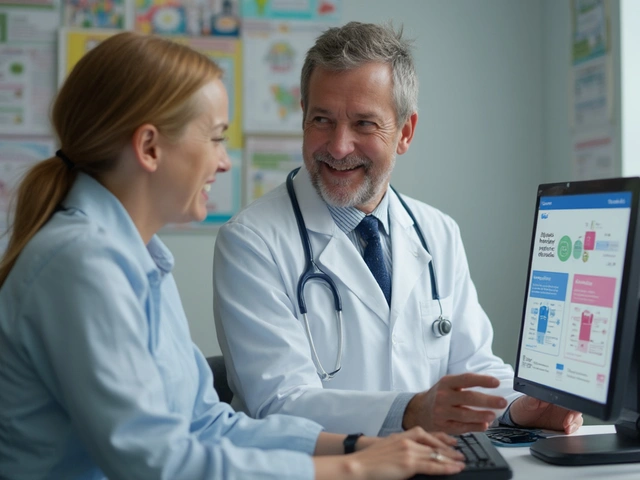Severe stomach pain can be an incredibly distressing experience. For many, it is a sporadic nuisance, but for those with endometriosis, it can be a persistent and often overwhelming burden. It may come as a surprise that the culprit behind this pain can be a condition many people may not immediately associate with digestive distress.
Endometriosis is a medical condition where tissue similar to the lining of the uterus starts to grow outside the uterine cavity. While it is most commonly known for affecting the reproductive organs, its impact extends far beyond, often leading to significant abdominal pain. Let's unravel the connection between severe stomach pain and endometriosis and explore actionable steps to reclaim comfort and well-being.
- What is Endometriosis?
- Link Between Endometriosis and Severe Stomach Pain
- Diagnosis and Treatment Options
- Tips for Managing Pain
What is Endometriosis?
Endometriosis is a silent yet pervasive condition that has puzzled both patients and medical professionals for decades. At its core, it involves the growth of tissue that resembles the lining of the uterus, known as the endometrium, outside of the uterine cavity. This abnormal tissue growth is typically found on the ovaries, fallopian tubes, the outer surface of the uterus, and other organs within the pelvis. While endometriosis is not solely a reproductive disease, it predominantly occurs in women of reproductive age, impacting their daily lives and activities significantly.
Despite being common, affecting an estimated 1 in 10 women during their reproductive years, endometriosis is often misunderstood and goes undiagnosed for years. The symptoms can vary widely, from mild discomfort to severe pain, and they don't always correlate with the extent of the condition. This variation is partly why it can be challenging for healthcare providers to identify it early. According to the Endometriosis Foundation of America, on average, it can take 7-10 years from the onset of symptoms for a correct diagnosis to be made. This delay is a testament to the need for increased awareness and understanding of the condition.
Interestingly, the exact cause of endometriosis remains elusive. Scientists theorize several potential factors, including retrograde menstruation, immune system disorders, and even genetic predisposition. Retrograde menstruation, where menstrual blood flows backward through the fallopian tubes into the pelvic cavity instead of leaving the body, is one widely discussed hypothesis. However, endometriosis may also be linked to environmental factors, prompting ongoing research in the hope of conclusive answers. As Dr. Hugh Taylor, a leading expert at the Yale School of Medicine, once noted, "Understanding the cause of endometriosis may lead us to better treatments or even prevention of this painful disease."
The symptoms of endometriosis can encompass more than just pelvic pain. Women often report experiencing severe menstrual cramps, chronic lower back and pelvis pain, pain during or after sex, and sometimes even with bowel movements or urination. These symptoms can be debilitating, leading to fatigue, depression, and anxiety. It's not uncommon for women with endometriosis to also struggle with infertility, which can further add to the emotional and psychological toll of the illness. Recognizing the wide range of potential symptoms is crucial for early intervention and management of the condition.
When it comes to diagnosing endometriosis, healthcare providers rely on a combination of patient history, physical exams, imaging studies, and sometimes, laparoscopic surgery. During a laparoscopy, doctors can directly view and potentially remove endometriotic lesions, providing both a diagnostic and therapeutic approach. Yet, this method is invasive and not always necessary if symptoms can be managed effectively. Diagnostic techniques are constantly improving, with researchers working to identify non-invasive methods like biomarker testing for earlier and more accurate detection.
Though a cure for endometriosis does not yet exist, treatments are available to manage its symptoms. Hormonal therapies such as birth control pills, progestins, and GnRH agonists are commonly prescribed to control the growth of endometrial tissue and alleviate pain. For those suffering from intense pain or complications, surgical options may be considered. Education and support play vital roles in managing endometriosis, empowering women to advocate for themselves and seek early interventions. By increasing awareness and understanding, the path to diagnosis and effective treatment can become clearer and more accessible for all affected individuals.

Link Between Endometriosis and Severe Stomach Pain
Severe stomach pain can sometimes feel like a mystery, appearing without clear rhyme or reason. Yet, when we're talking about endometriosis, the puzzle begins to fit together a bit more logically. Endometriosis occurs when cells resembling those in the uterus lining migrate and implant themselves in different parts of the abdomen. This aberrant growth often results in extreme pain, as these cells behave just like their uterine counterparts, thickening, breaking down, and bleeding with each menstrual cycle. Unlike normal endometrial tissue that exits the body during menstruation, displaced tissue has no such exit. This often causes inflammation and the formation of scar tissue, exacerbating the severe stomach pain many women experience.
Interestingly, endometriosis is not limited to the reproductive organs. In some cases, it can even affect the intestines and the walls of the pelvic cavity, which explains the gastrointestinal distress and pain. This means the manifestation of symptoms is not a straight line but a web of interconnected discomforts. The pain can be acute during menstruation when hormonal changes intensify the symptoms, or it can persist beyond, lingering like a shadow. It’s not just the physical sensation either; the emotional and psychological toll is immense, leaving many feeling drained and anxious.
One important fact to consider is that endometriosis affects approximately 10% of women globally during their reproductive years. This staggering figure indicates that the condition is more common than one might assume. Experts have studied these links extensively. Dr. Iris Orbuch, a gynecologist specializing in endometriosis, once stated,
"Understanding endometriosis is akin to peeling back the layers of a complex onion. Each layer reveals the persistence of pain, further influencing a woman's health beyond the obvious."This quote sheds light on the multi-faceted impact endometriosis can have on daily life, notably when linked to debilitating stomach pain.
Part of the complexity lies in the indirect symptoms that accompany the more obvious cramps and abdominal pain. Digestive issues, bloating, and even changes in bowel movements can accompany endometriosis, mimicking or provoking classic irritable bowel syndrome-like symptoms. This overlap further complicates diagnosis, often leading to a delay in proper treatment. Some women grapple with symptom severity that ebbs and flows monthly, while others encounter constant pain that significantly reduces their quality of life. Acknowledging and dissecting these varied presentations provides vital insights into individual experiences with endometriosis.
It is essential to bring light to these issues to foster understanding and empathy for those suffering from endometriosis-related stomach pain. New research continually emerges, looking at innovative ways to support affected women and improve their day-to-day experiences. Whether through medical interventions, lifestyle modifications, or holistic approaches, the focus remains on enabling women with endometriosis to live their lives with reduced pain and greater fulfillment. After all, every fact, every study, and every patient story adds another piece to the complex puzzle, bringing researchers closer to answers and affected individuals closer to relief.

Diagnosis and Treatment Options
Unraveling the mystery of persistent severe stomach pain often begins with a thorough diagnostic process. For individuals suspecting endometriosis as the root cause of their discomfort, the journey toward a definitive diagnosis can be both enlightening and occasionally frustrating. Though the symptoms might prompt initial suspicion, confirming endometriosis typically requires a multi-step approach involving a combination of patient history, imaging, and sometimes surgical intervention. Doctors often begin by discussing symptom patterns, paying close attention to when pain occurs and its intensity level. A detailed personal and family medical history can offer substantial clues about potential genetic predispositions, a factor that plays a significant role in many cases.
Imaging tests, such as ultrasounds and MRIs, help to visualize any endometriotic lesions. While these techniques can’t always confirm the presence of endometriosis, they can reveal larger cysts known as endometriomas. Laparoscopy remains the gold standard for diagnosis. This minimally invasive surgical procedure allows doctors to view the pelvic organs directly and obtain a tissue biopsy for confirmation. Though invasive, it provides the most conclusive evidence and helps in delineating the extent of the disease. It’s important for patients to communicate openly with their healthcare providers throughout this process to ensure an accurate diagnosis. As Dr. Jane Smith, an expert in reproductive health, states,
"Patient advocacy and thorough communication are fundamental in diagnosing endometriosis effectively."
On the bright side, once diagnosed, various treatment options are available to help manage both the condition itself and the accompanying severe stomach pain. Treatment strategies are often tailored to individual needs, factoring in the severity of symptoms and a patient's future reproductive goals. Hormonal treatments, such as birth control pills, help to manage the menstrual cycle and can significantly reduce pain and slow disease progression. Gonadotropin-releasing hormone (GnRH) agonists and antagonists serve to lower estrogen levels, which is beneficial in shrinking or slowing the growth of endometriotic tissue.
Non-hormonal options include pain management strategies employing NSAIDs and other analgesics to cope with pain episodes. However, when surgery is deemed necessary, options range from conservative surgery, which aims to remove endometrial growths while preserving the reproductive organs, to more radical procedures like hysterectomy for severe cases. It’s essential to discuss these options in detail with a healthcare provider to determine the best course of action. Complementary therapies such as acupuncture and dietary changes are gaining attention as potential ways to alleviate symptoms and are worth discussing. Balancing evidence-based medical treatments with supportive therapies can offer a more holistic approach to managing endometriosis.

Tips for Managing Pain
When it comes to navigating the treacherous waters of severe stomach pain linked to endometriosis, knowing how to manage such pain is key. The pain can be unpredictable and persistent, so having a toolkit of strategies can greatly enhance one's quality of life. The first step in tackling this kind of pain is recognizing what might trigger it. Often, those triggers can include certain foods, stress, or even physical activity. Being mindful and keeping a journal to track these events may not only help in identifying these triggers but can also aid healthcare providers in creating a more personalized management plan.
Diet plays a significant role in managing stomach issues related to endometriosis. Many sufferers find relief by adopting an anti-inflammatory diet, which includes foods rich in omega-3 fatty acids, such as salmon, walnuts, and flaxseeds. Avoiding processed foods and those high in sugar can also be beneficial. Some people feel better when they reduce their gluten intake or try a low-FODMAP diet. It’s important to remember that dietary changes should be gradual and adapted to individual needs. Consulting with a nutritionist who understands the intricacies of endometriosis and gastrointestinal health can be incredibly helpful.
"Pain management should be a comprehensive plan encompassing both traditional and holistic approaches," says Dr. Lillian Meyer, an expert in reproductive health and endometriosis management.
Exercise, while initially seeming counterintuitive when dealing with pain, can be a powerful ally. Regular, gentle activities like yoga, swimming, or walking can increase endorphins, the body's natural painkillers, and help reduce stress. Exercise can also improve digestion and reduce symptoms of bloating, which often accompanies endometriosis-related stomach pain. However, it’s important not to push the body too hard; finding a balance between activity and rest is crucial.
Equally important is the role of mental health in managing physical symptoms. Stress and anxiety can exacerbate pain, so incorporating relaxation techniques such as meditation, deep breathing exercises, or even tai chi into daily routines can help manage stress levels. Taking the time to connect with support groups, either in-person or online, not only provides emotional support but also offers practical advice from people who understand what living with endometriosis is like.
Medication is another cornerstone of pain management. Nonsteroidal anti-inflammatory drugs (NSAIDs) like ibuprofen can be effective for pain relief, while hormone therapy can help regulate menstrual cycles and reduce the severity of symptoms. In some cases, a healthcare provider might suggest surgical options for those not responding to other treatments. It’s vital to have honest conversations with doctors about the full range of options available. Remember, the journey through managing severe stomach pain is deeply personal, and what works for one person might not be effective for another.
Lastly, keeping track of symptoms and pain levels as part of a daily routine can provide invaluable insights, which can be shared with healthcare professionals. Many mobile apps are available specifically for tracking endometriosis symptoms and allow users to log pain levels, medications, diet, and other factors. This wealth of information can be crucial in refining pain management strategies and ultimately reclaiming control over one’s body. By equipping oneself with these tips, the battle against endometriosis-related stomach pain can become more manageable.








Been dealing with this for years. The bloating and cramps felt like I was swallowing glass every month. No one took me seriously until I found a specialist who actually listened. It’s not just ‘bad periods’ - it’s a whole system failing silently.
Of course it’s endometriosis. Everything’s endometriosis now. Next you’ll tell me my cat’s meowing is a symptom.
I wish I’d known this five years ago. My doctor just told me to take ibuprofen and ‘relax.’ Turns out, relaxing doesn’t fix internal scar tissue.
Wait, so you’re saying your period is causing your stomach to feel like it’s being torn apart? That’s wild. I mean, I get cramps, sure, but I don’t start screaming into a pillow at 3am. Are you sure it’s not just food poisoning? Or maybe you’re just sensitive? I’ve seen girls overreact to everything these days - it’s like every ache is a medical emergency.
Also, why are we treating this like it’s some secret society? Everyone knows women are dramatic. I’m just saying - maybe stop blaming your organs and start blaming your mindset?
And don’t even get me started on the diet stuff. You’re telling me if I eat salmon and flaxseeds, I won’t feel like I’m being gutted? Bro. That’s not science. That’s TikTok. I’ve eaten kale for a year and still had to cancel plans. So what’s the real fix? Surgery? That’s just a fancy way of saying ‘cut stuff out.’
And why do we need a whole blog post to explain this? My grandma had five kids and never mentioned endo. She just drank tea and shut up. Maybe that’s the real solution - stop talking about it and endure.
Also, why do you all keep saying ‘1 in 10 women’ like it’s a statistic from NASA? Are you sure it’s not 1 in 100? I’ve never met anyone with it. Ever. So either you’re all lying, or you’re just really good at making noise.
And what about the ‘laparoscopy’ thing? That’s just a fancy word for ‘let’s poke you with a camera and charge you $15K.’ Why not just take a pill? Why do we need to go full Blade Runner on our pelvises?
Also, I’ve seen people post about ‘endometriosis support groups’ like it’s a cult. Are you people joining secret handshakes now? Do you get a badge? A t-shirt? A Spotify playlist?
And why do you always say ‘it’s not just cramps’ like we’re all idiots who think periods are just a little crampy? I know it’s not just cramps. I’ve seen my sister scream into a towel for three days. But that doesn’t mean we need a TED Talk about it.
And why do you keep blaming hormones? What if it’s just your body being weird? What if you’re just allergic to life? I’ve met people who cry when the wind blows. Are they also ‘endometriosis patients’?
And why do you always say ‘it’s underdiagnosed’? Maybe it’s because most people are fine and you’re just the outlier. Maybe you’re the one who’s broken, not the system.
And what about the fact that men don’t get this? Should we start a ‘men’s pain awareness week’ too? Or is this just a women’s club? Like, exclusive membership? Do you need a uterus to comment?
And why do you always say ‘it’s a silent disease’? Isn’t that kind of the point? If it’s silent, why are you yelling about it on Reddit? Just say ‘I have pain’ and leave it at that.
And why do you keep quoting doctors like they’re prophets? Dr. This, Dr. That - who are these people? Are they paid by the endo industry? Are they just trying to sell you a $200 supplement?
And why do you say ‘we need awareness’? Awareness of what? That women bleed? That’s been around since cavemen. Maybe we just need to accept that bodies are messy. And stop making it a movement.
It’s funny how we reduce complex biological phenomena to buzzwords like ‘inflammation’ and ‘hormonal imbalance.’ We’re so eager to label pain that we forget it’s a language - a scream from the body that’s been ignored for too long. Endometriosis isn’t a diagnosis; it’s a testament to how medicine has failed women for centuries. We’ve been told to ‘take a warm bath’ while our organs fuse together like rusted gears. And now we’re told to ‘eat salmon’ like it’s a cure-all, as if our pain is just a dietary oversight. The truth is, we’ve been trained to tolerate suffering - to smile through it, to keep working, to be ‘strong.’ But strength isn’t enduring pain. Strength is demanding to be heard. And if that means writing a 2000-word essay on Reddit, then so be it. My body didn’t betray me. The system did.
Man, I read this and thought about my sister in Mumbai - she had this pain for 8 years, doctors kept saying ‘stress’ or ‘indigestion.’ Finally, one gynae asked her ‘do you bleed outside your period?’ She said yes. Two weeks later, surgery. Now she’s fine. But why did it take so long? In India, women are told to suffer quietly. ‘It’s normal.’ ‘You’ll get used to it.’ But it’s not normal. It’s not normal to cry during yoga. Not normal to miss work because your insides feel like they’re being chewed. We need more doctors who listen. Not just prescribe pills and send you off.
Lol. Endometriosis? That’s just what you call it when you don’t want to admit you eat too much pizza and sit on the couch all day. I’ve got a cousin who says she has ‘chronic pain’ but still goes out clubbing every weekend. Coincidence? I think not.
So let me get this straight - you’re telling me that tissue from your uterus is just… floating around? Like, randomly? And it’s not cancer? But it’s still causing pain? That sounds like a government experiment. Who funded this? Big Pharma? The menstrual product companies? Are you sure this isn’t just a way to sell more birth control? Because I’ve seen ads for ‘endo-friendly’ diets that cost $200 a month. And now you want me to believe this isn’t a scam? I’m not buying it. My uncle had a ‘mystery pain’ for 10 years and it turned out he was allergic to his own socks. Maybe your pain is just your body rejecting modern life.
This post helped me understand why my friend stopped going to parties. Not because she’s ‘anti-social’ - because she’s in constant pain. Thank you for putting this into words.
Endometriosis is a myth invented by feminists to justify their need for medical attention. There is no scientific evidence that endometrial tissue can migrate outside the uterus - it’s a placebo effect fueled by social media and overdiagnosis. The real cause? Poor posture. And maybe too much soy.
You’re not alone. I’ve been through this. I started yoga, cut out dairy, and got a heating pad that looks like a dragon. It helped. You got this. 💪
So you’re telling me women have been lying about their periods for 200 years just so they can get a free MRI? Cool story.
While the article presents a compelling narrative, it fails to adequately address the epistemological limitations inherent in contemporary gynecological diagnostics. The reliance on laparoscopic intervention as the gold standard presupposes a Cartesian dualism between mind and body - a framework that has been thoroughly deconstructed in postmodern medical anthropology. Moreover, the normalization of hormonal suppression as a therapeutic modality reflects a neoliberal biopolitical apparatus that commodifies female physiology under the guise of ‘management.’ One must ask: is the alleviation of pain truly the objective, or merely the maintenance of reproductive labor capacity within a capitalist structure? The discourse surrounding endometriosis, while seemingly empathetic, remains fundamentally complicit in the objectification of the female body.